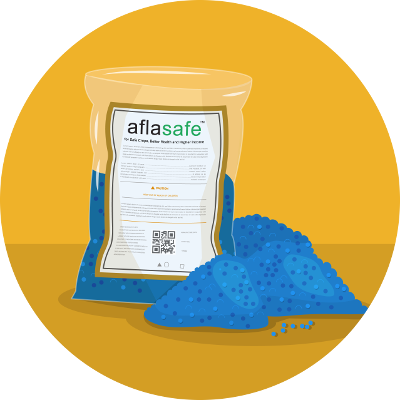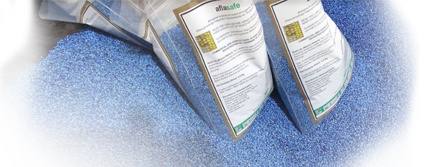 This is a time when many within and outside CGIAR – including national and regional research organisations – are exploring the best way to partner with the private sector to broadly disseminate technologies and deliver impact. For this reason, I believe that our practical experience and lessons learnt in technology transfer and commercialisation of Aflasafe are timely in informing these vital dialogues. In just two years, we have successfully partnered with four well-established private companies to manufacture and/or distribute Aflasafe products in six African countries. Each party brings to the table a strength that the other lacks. The companies have business experience and capital, while IITA brings the science, and political support from national governments. The result: we are almost at the 2,000-tonne mark for Aflasafe distributed – enough to protect 200,000 hectares of maize, groundnuts and sorghum.
This is a time when many within and outside CGIAR – including national and regional research organisations – are exploring the best way to partner with the private sector to broadly disseminate technologies and deliver impact. For this reason, I believe that our practical experience and lessons learnt in technology transfer and commercialisation of Aflasafe are timely in informing these vital dialogues. In just two years, we have successfully partnered with four well-established private companies to manufacture and/or distribute Aflasafe products in six African countries. Each party brings to the table a strength that the other lacks. The companies have business experience and capital, while IITA brings the science, and political support from national governments. The result: we are almost at the 2,000-tonne mark for Aflasafe distributed – enough to protect 200,000 hectares of maize, groundnuts and sorghum.
In this third edition of our newsletter, we walk you through the key milestones along our journey thus far in diverse countries. Allow me to highlight the main features:
- The support from national governments continues to grow from strength to strength. Case in point: the official visit of Kenya’s Cabinet Secretary for Agriculture and Irrigation to the Aflasafe factory in Katumani, Machakos County, and his commitment to table a national policy on aflatoxin which will include Aflasafe.
- Our partnership with private companies for Aflasafe distribution too continues to expand. Latest entrants are Groupe Eléphant Vert and Macrofertil Ghana Limited, who will distribute Aflasafe in Burkina Faso and Ghana respectively.
- In collaboration with national governments and distribution partners, ATTC successfully facilitated the launch of Aflasafe BF01 in Burkina Faso and Aflasafe GH02 in Ghana.
In my previous message, I underscored the vital need for support from other development partners to complement the efforts of ATTC and its manufacturing and distribution partners. We have since moved from words and wishing to action and realisation. I am delighted to report that we are now working with the Alliance for a Green Revolution in Africa (AGRA) to include Aflasafe in the technology package promoted by AGRA, in countries where we jointly operate. We are also partnering with AGRA and relevant public institutions to raise awareness at national level about the negative impacts of aflatoxin. We hope that more of you will join The Safer Food in Africa Movement.
Rounding off our current engagements on a continental note, in Quarter 3 we will jointly co-host with AGRA and the Partnership for Aflatoxin Control in Africa (PACA) a side event on the theme Raising Food Safety and Quality Standards: An Essential Bedrock of the African Green Revolution at the 2018 edition of the African Green Revolution Forum (AGRF). During this event, we will discuss options for dissemination of proven aflatoxin control technologies such as Aflasafe for sustainable adoption by smallholder farmers and other value-chain actors. We will also explore the roles of the public and private sectors and other partners for commercialisation of these technologies. We look forward to seeing many of you at this event in Kigali. Please save the date: 6th September 2018, 17:00–18:30 hrs.
In the meantime, enjoy this 3rd edition of ATTC News.
Abdou Konlambigue
Managing Director, Aflasafe Technology Transfer and Commercialisation, IITA
June 2018










